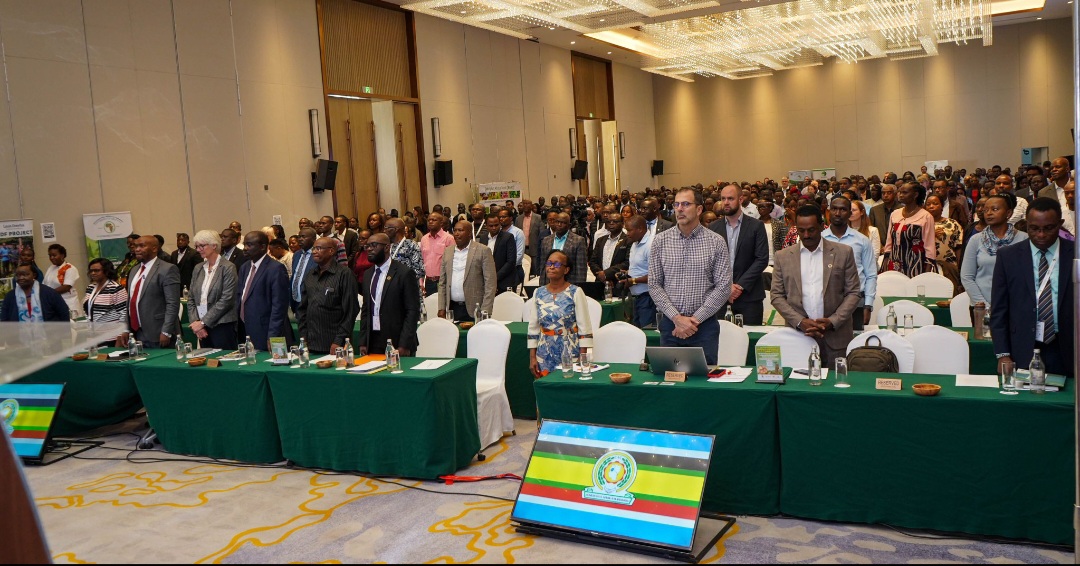In a move to propel the growing global movement for agroecology, Kenya is currently hosting the second Eastern Africa Agroecology Conference (EAAC) in Nairobi.
The EAAC conference aims to motivate stakeholders to invest in interventions that transform current unsustainable food systems by transitioning towards agroecology and more environmentally friendly solutions with long-term vision and planning.
It has attracted over 700 participants from across Africa and beyond, drawn from representatives of governments, the private sector, farmers’ associations, NGOs, academia, research institutions, investors, and development partners.
Organised by Biovision Africa Trust, the Ministry of Agriculture and Livestock Development, and over twenty partners, the conference seeks to harness the potential of agroecology in transforming and sustaining resilient agri-food systems.
Themed ‘Strengthening Agri-Food System Transformation for Resilience, Sustainability and Socioeconomic Development’, the event promotes sustainable organic farming systems to improve food security, agricultural productivity and livelihoods across Africa while safeguarding the environment.

Speaking during the launch on behalf of the Cabinet Secretary of the Ministry of Agriculture, Mutahi Kagwe, Director of Livestock Policy Research and Regulation in the state department of livestock, Dr. Christopher Wanga, underscored Kenya’s commitment to agroecology through its establishment of the National Agroecology Strategy for Food System Transformation (2024–2033).
Wanga said the strategy seeks to facilitate the development of sustainable agri-food production systems in line with the government’s Bottom-up Economic Transformation Agenda (BETA), Vision 2030, and the Sustainable Development Goals (SDGs).
“Kenya is now in the implementation phase of the National Agroecology Strategy 2024-2033, establishing a structured coordination mechanism for all stakeholders in the agroecology space,” said Wanga.
He further related Kenya’s policy direction with continental strategies such as the AU’s Kampala Declaration and the Africa Fertiliser and Soil Health Summit’s Nairobi Declaration, both recognising agroecology as a critical pathway.
“We must increase biodiversity, guarantee animal health, ensure the ground is not exposed, and save our natural resources,” said Wanga, emphasising the importance of interlinking policies and urging mainstreaming agroecology across counties, farms, and enterprises.
He further said the conference offers a platform to showcase innovation, share ideas and form partnerships to position East Africa as a premier ecotourism and agroecology destination.
“Agroecology offers a science-based and community-centred pathway for rebuilding our food systems, emphasising soil health, biodiversity, indigenous knowledge and equitable value chains,” he said.
Biovision Africa Trust Executive Director Dr. David Amudavi said the EAAC conference is more than just a meeting; it is a movement. A call to action for a more just, resilient, and sustainable future.
“Agroecology is not just a concept or a farming method; it is a movement with a call for action, policy alignment, and community-driven solutions to transform our country’s food systems,” he said.
Amudavi revealed that Kenya is among the top ten African countries in organic agriculture, with over 173,000 hectares of land that have been converted into organic farms and about 63,000 farmers who have been certified as producers.
“At the heart of the conference are the voices of farmers who are practising agroecology and organic farming and are producing more, spending less and reclaiming their dignity,” he said.
He stressed that climate change is no longer a future threat. It is our daily reality that farmers can no longer predict the rains as they once did.
“It is important for us to inspire action towards environmentally friendly systems aligned to important declarations, especially the policy frameworks on SDGs,” he said.
The Biovision Executive Director further said the degradation of our ecosystems and biodiversity loss is not just an environmental concern but a direct threat to food production and human well-being.
He emphasised the paradox of increasing chemical fertiliser use alongside declining soil productivity and advocated for local solutions such as composting, biofertiliser, and vermiculture.
Dr. Petra Jacobi, delivering her remarks on behalf of GIZ Country Director Bodo Immink, emphasised the importance of empowering farmers as change agents, adding thatagroecological innovations had increased incomes by 35 per cent among over 100,000 households.
“If governments provide an enabling framework and public investment, farmers, civil society, the private sector and communities will be empowered and will provide transformative change,” said Jacobi, the ‘Rural Development’ project manager at GIZ.
She said that Kenya’s National Agroecology Strategy, developed through a participatory process, offers a long-term framework for food systems transformation.

“Current agricultural systems prioritise short-term gains over the resilience and prosperity of future generations. This must change,” she said.
Uganda State Minister for Agriculture Fred Bwino expressed pride in Uganda’s progress in institutionalising agroecology as a science, a practice, and a movement.
“Governments ought to raise awareness, commit funding and also provide an enabling framework and environment in order for agroecology to transform food systems in a sustainable way,” he said.
Strengthen the agroecology movement by fostering collaborations, knowledge sharing and capacity building among policyholders, farmers, researchers, development partners and investors.
The week-long conference will provide a forum to discuss issues including evidence generation of agroecology impacts, scaling up agroecological transitions, investment in research and innovation, trade opportunities, and engagement of small-scale food producers.
The conference will also offer field excursions where participants will visit selected agroecology sites to witness community-level innovations and impacts in action.
By Anita Omwenga





